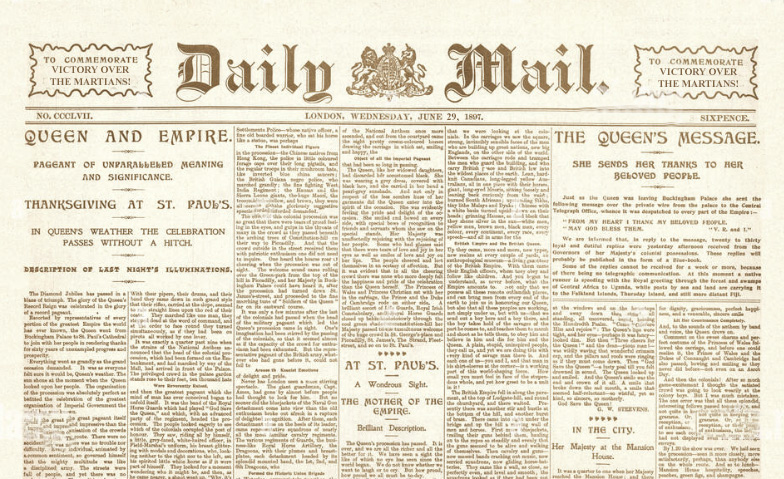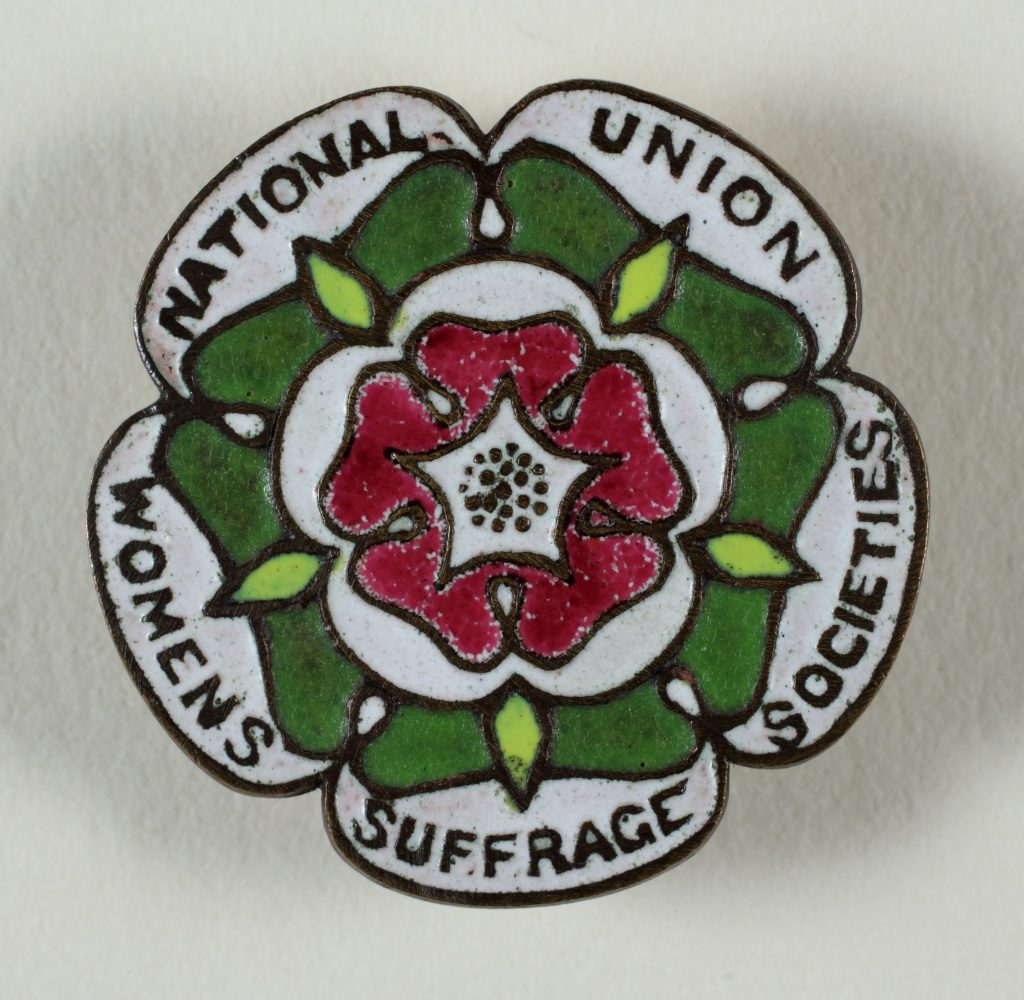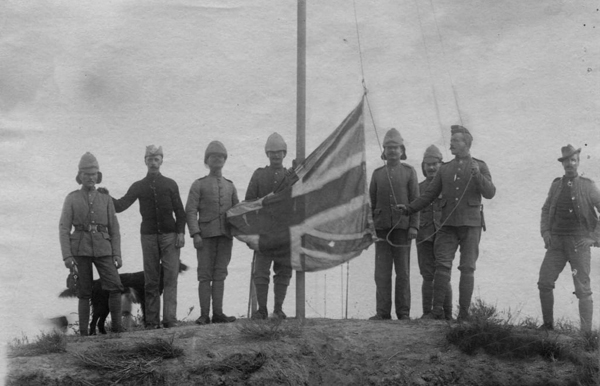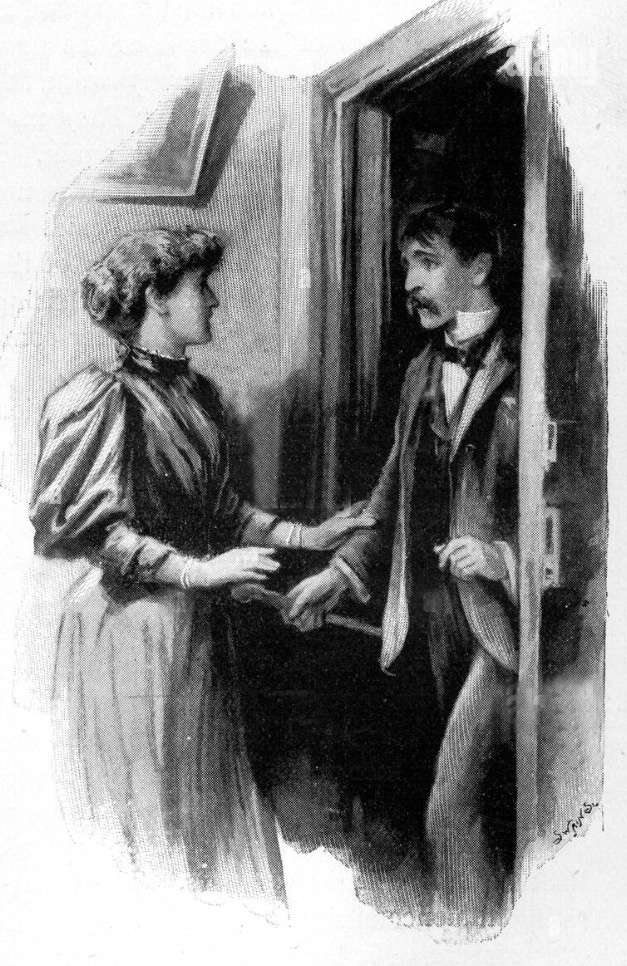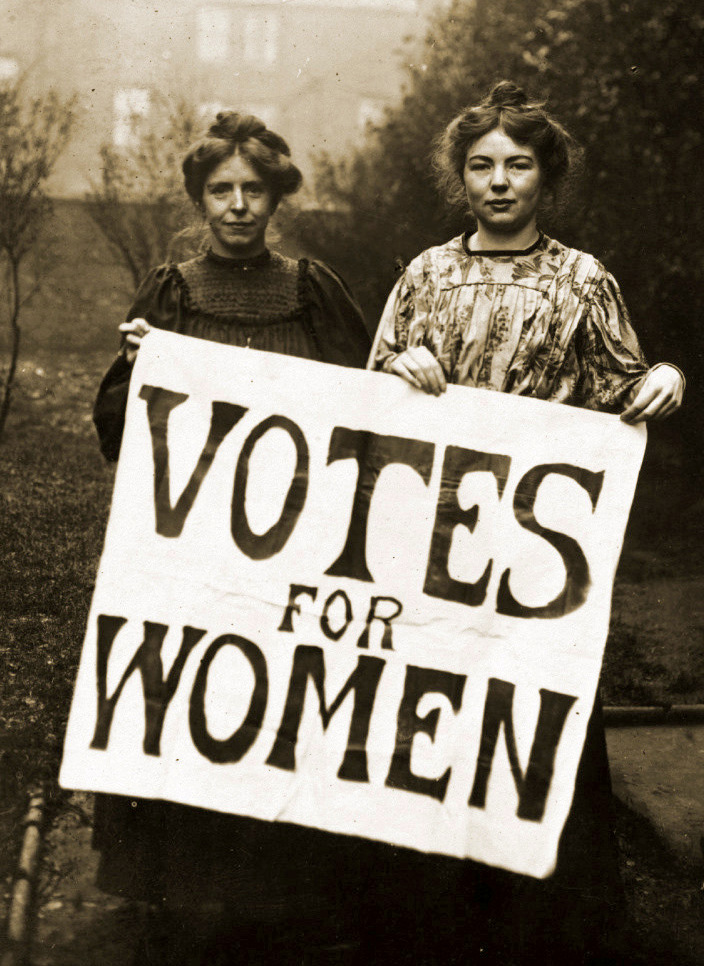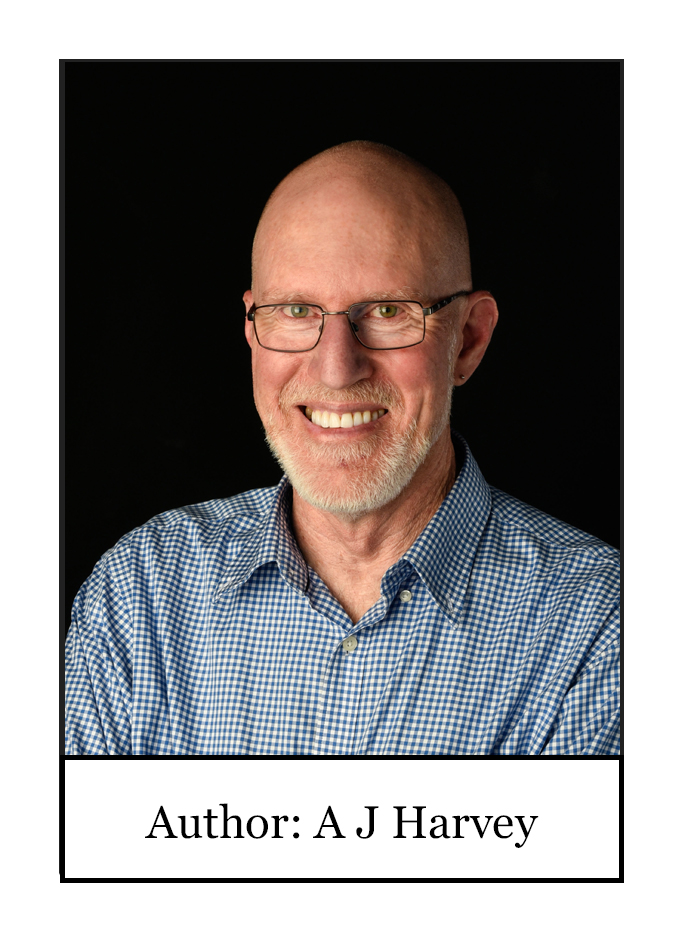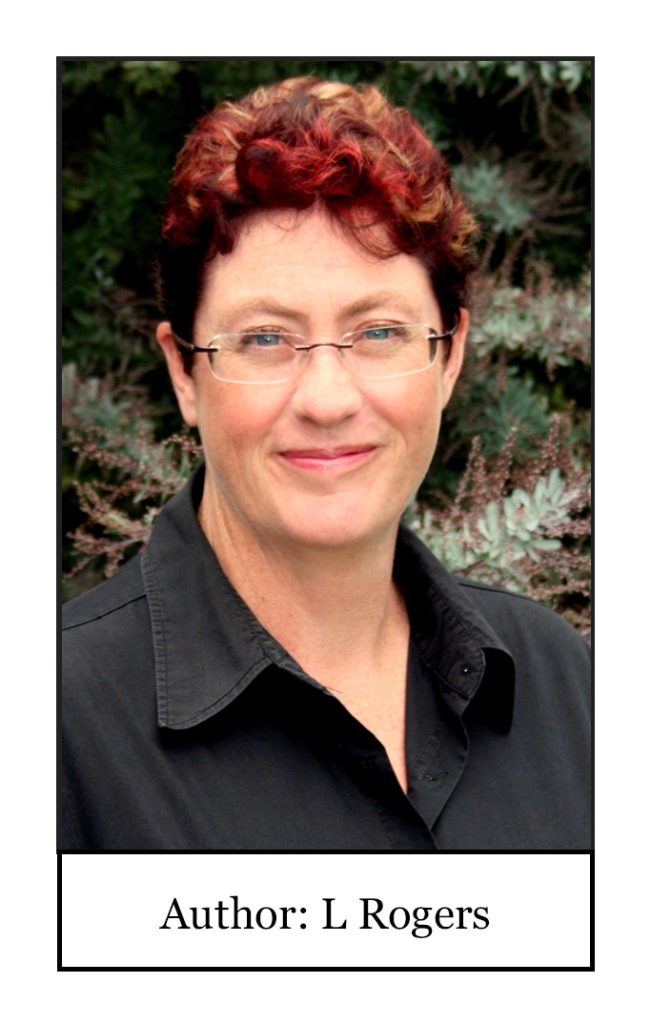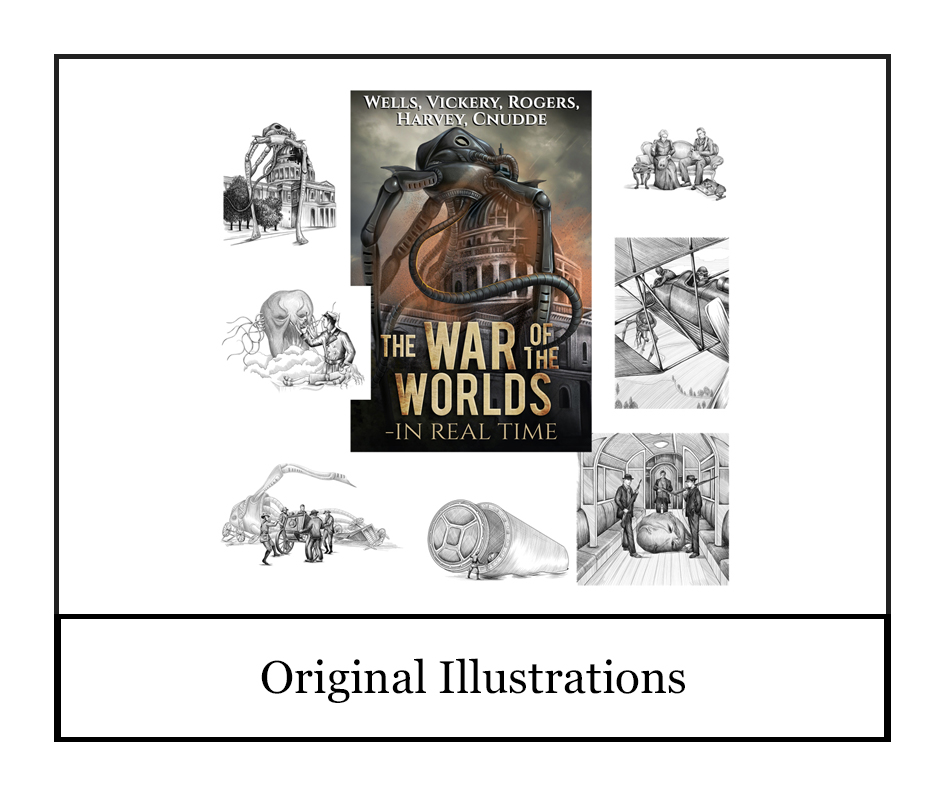What Happened Next
As the Daily Mail resumes publication Wells recovers sufficiently to bid farewell to London, but before he leaves he ventures out one more time to observe the return of its inhabitants.
And for Toni, released from the massive responsibility of operating the only functioning ‘hospital’ in London, her mind can turn to other things – like what to do now, and what the future might look like.
#Patients are now being transported to #London’s reopened #hospitals. I feel…#strange…#WasHelping #WantToHelp
@LizCadbury says we are still helping. @GraceHarwoodStewart and I will head into the streets as #QueenAnnesMansions empties. Our #nurses are travelling with our #patients, but our #oldies are keen to help.
Despite the family’s attempts to dissuade Wells from travelling to Leatherhead, Wells decides to look once more on whatever remained of the little life that seemed so happy and bright in his past. Though he promises to stay with them that night.
Wells returns to the streets that had lately been so dark and strange and empty, but are now already busy with returning people; in places there were even shops open, and he pauses to gaze at a drinking-fountain running water.
The streets around Wells are busy and vivid the moving life. So many people were abroad everywhere, busied in a thousand activities, that it seemed incredible that any great proportion of the population could have been slain.
But then he notices the yellow skins of the people he met, how shaggy the hair of the men, how large and bright their eyes, and that every other man still wore his dirty rags. The faces seemed all with one of two expressions—a leaping exultation and energy or a grim resolution.
Save for the expression of the faces, London seems a city of tramps. The vestries are indiscriminately distributing bread sent by the French government. The ribs of the few horses show dismally, while haggard special constables with white badges stand at every corner.
Ventured out into the streets with @GraceHarwoodStewart. @LizCadbury was correct. Many people needed #help. #IAmStillHelping #determination #IAmUseful
Thinking about returning to my studies now. @graceharwoodstewart is nearly qualified. I have a way to go. But #iwillbeadoctor #ihavebeenadoctor when there was no-one else.
Missing @HGWellsBro #sadness #WillItStillBeTheSame?
Wells, back in his own mind, and taking advantage of the free trains running from Waterloo, returns to Woking to be reunited with his wife.
While Toni receives word from her friend (Well’s brother) that he had survived the war in a French refugee camp.
And for those still with us we explore what the future will bring for those who have shared their lives with us during this fictionalised docudrama, starting with the 1900 election and David Lloyd George’s landside victory that resulted in Salisbury’s coalition of Unionists and Conservatives being reduced to a mere rump as the Liberals win 54% of the vote, while the Labour Representation Committee, later to become the Labour Party, wins 25%.
Free trains are being run from Waterloo to return people to their homes. The first rush being over Wells gets a compartment to himself. Just outside the terminus the train jolts over temporary rails, and Wells averts his eyes from the blackened ruins lining the track.
For those such as Wells returning home to Woking, England is a shock, the country appears gaunt and unfamiliar; Wimbledon particularly had suffered. Walton, by virtue of its unburned pine-woods, seems the least hurt of any place along the line to Woking.
Wells writes that “every little stream was a heaped mass of red weed, in appearance between butcher’s meat and pickled cabbage.”
Awoke to news of free trains shipping people back to #London. @LizCadbury says we can stay for a while to sort out our affairs. #relieved #oldies are now back in their own apartments, but we are #family
Will miss everyone here when I leave. @SirJohnTheEngineer says to come over for dinner each week. #WillBeNice #family #friends
Heading to @NUWSS HQ for another meeting this morning. @MilliFawcett says we need to capitalise on the momentum #WeDemandTheVote #WomenInPolitics
The line on the London side of Woking station is still under repair, so Wells descends at Byfleet and takes the road to Maybury, past the place where he and the artilleryman had talked to the hussars, and on by the spot where he had first seen the Martian during the storm.
Well’s house is standing, but hope for his wife fades when he sees the door has been forced. Inside his house hope fades, but then a voice. “It is no use. The house is deserted. No one has been here these ten days. Do not stay here to torment yourself. No one escaped but you.”
Startled he turns to see the French window open behind him. And there, amazed and afraid, even as Wells stood amazed and afraid, were his cousin and his wife — his wife white and tearless. She gives a faint cry.
“I came,” she says, “I knew—knew—” She puts her hand to her throat — sways. Wells makes a step forward, and catches her in his arms.
@RationalDressSociety your #DividedSkirts with #pockets saved my life. I mean it. They saved my life. #RoomForGasMask #CouldMove #NeverWearingANormalSkirtAgain
BEST NEWS EVER @HGWellsBro is ALIVE!!!!!!! Received telegram a few moments ago.
@HGWELLS-BRO HOW DID YOU END UP IN #FRANCE QUERY LIKE SERIOUSLY COMMA YOU SAID YOU WERE GOING TO #WOKING STOP #SO-HAPPY #YOU-MUST-BECOME-ALLY ENDS
@HG-WELLS-BRO FORGOT STOP YOU OWE ME DINNER STOP KEPT DIARY IN TELEGRAPH STYLE FOR #ENTIRE-MONTH ENDS
‘Postscript & Afterwords’
While bidding farewell to those who have shared their lives with us over the past month, we should remember that many of those who survived the Martian invasion would continue to suffer its consequences for the rest of their lives.
Indeed, while Well’s was eventually re-united with his wife, he continued to suffer, as many others did, the trauma of what they had lived through during that terrible time. The last words of his seminal work provide some insight into that:
‘I must confess the stress and danger of that time have left an abiding sense of doubt and insecurity in my mind and suddenly I see again the valley below me set with writhing flames, and feel the house behind and about me empty and desolate…
‘I go to London and see the busy multitudes in Fleet Street and the Strand and it comes across my mind that they are but the ghosts of the past, haunting the streets that I have seen silent and wretched, phantasms in a dead city the mockery of life in a galvanised body…
‘Of a night I see the black powder darkening the silent streets, and the contorted bodies shrouded in that layer. They rise upon me tattered and dog-bitten, they gibber and grow fiercer…and I wake cold and wretched.’
England’s recovery from the devastation caused by the Martians took several years, indeed St Pauls was not reopened for ten years, while the government remained in Birmingham until repairs were completed to Westminister in mid 1898.
With the damage London had suffered, Queen Victoria’s initial reluctance to have a formal parade to celebrate her Diamond Jubilee (which had been planned for 22 June 1897) resurfaced.
However, when presented with a petition signed by all members of parliament supporting the celebration the Queen conceded, and at 11:15 am on Sunday 19 July 1898, the Queen, took an open carriage from the Palace to Westminster, where a thanksgiving service took place.
David Lloyd George, 1st Earl Lloyd-George of Dwyfor, OM, KStJ, PC (17 January 1863 – 26 March 1945) was Prime Minister of the United Kingdom from 1900 to 1922. A Liberal Party statesman and politician from Wales, he was known for the social-reform policies he introduced (including the National Insurance Act 1911), and for negotiating the establishment of the Irish Free State. He was the last Liberal Party prime minister; the party fell into third-party status shortly after the end of his premiership.
He succeeded Robert Arthur Talbot Gascoyne-Cecil, 3rd Marquess of Salisbury KG GCVO PC FRS DL (1830 – 1903) the Conservative politician who had served as Prime Minister of the United Kingdom during the Martian invasion.
Despite beating the Martians, the 1900 election resulted in Salisbury’s coalition of Unionists and Conservatives being reduced to a mere rump with the Liberals gaining 54% of the vote, and the Labour Representation Committee, later to become the Labour Party, winning 25%.
Historians generally agree that the size of the Liberal victory was due to the anger those south of the Gascoyne-Cecil Line felt against the government who’d ‘left them behind’ to fend for themselves.
The organisation and grass roots support by groups, such as the NUWSS whose organisational ability had been built, and refined during the war, also proved vital to the size of the swing. Their reward, of course was the introduction of Universal Suffrage in 1902.
The ‘Universal Suffrage Act’ was one of the first Acts passed by the new Liberal government upon its election in 1900, but was subsequently rejected by the Conservative-dominated House of Lords.
Following a 2nd general election in December, the Act was passed with the assent of the new monarch, George V, after the House of Lords was forced to concede following the Government’s threat to overcome the Conservative majority in the Lords by creating a number of new peers.
Authored by:
- Michael Cnudde
- Andrew Harvey
- Leonie Rogers
- Ken Vickory
- HG Wells
Copyright Hague Publishing 2023
Interested in finding out what happened to Toni, Breaker, Roger, Maxim, and other characters mentioned in this fictionalised docudrama – then read on ….
Antoinette Louise Clark, or as we now know her, Dame Antoinette Louise Clark, GCVO, completed her medical training, following in the footsteps of her friend, Grace Harwood Stewart. Her experiences during the Martian Invasion shaped her service, and she continued to work with those most in need, particularly the poor, elderly, and infirm of London, as it recovered from the disaster.
She was mentored by her great friend, Dame Elizabeth Cadbury (GCVO), and remained an active member of the suffragist movement.
History was indeed shaped by the momentous events Toni so emotively described in her journal. The suffragists achieved the vote much earlier than they would have, if the #Martians had not invaded. Their role in organising those left ‘below the line’ in 1897, gave them a connection with the ordinary people of London, that cannot be downplayed.
Once they’d achieved the vote, they went on to leap into politics. They’d shown their metal, been tested in fire, and where the government of the day had given up, they’d persevered. London had not forgotten, and in many cases, not forgiven.
Millicent Fawcett became one of the first female MPs, and Elizabeth Cadbury, as we now know, would go on to serve as Britain’s first female prime minister.
Toni herself entered politics after a distinguished medial career, and became Britain’s first female health minister. We owe the current equity of access to care to her determination to see no-one left behind, ever again.
She remained friends with @hgwellsbro until his death, but was occasionally heard to lament his execrable taste in underwear right up to her dying day. Apparently the stripes made a lasting impression.
From A Suffragette’s War of the Worlds, by Persephone Maxim-Carver, Maidestone Press, 1916:
My husband spent the next three months recovering in hospital, being treated in an oxygen tent. After the War, medical science, including treatment of the victims of the Black Smoke, grew by leaps and bounds. I visited him daily in his ward, along with Amanda, whom we’d adopted.
To his regret, due to his injuries, Roger would never return to sea. He was promoted to Captain and retired on a full pension. Yet life went on. We married in the fall and Roger became a loving husband and father and divided his time between writing and working with Grandfather.
With the destruction of the Martian tower at Woking, Grandfather’s theories were proven correct, as within the week, all the Martians began to sicken and die. Yet Grandfather sought no reward for his contribution. He was at heart, perhaps a little overwhelmed by what he had done.
Our scientific knowledge increased one hundredfold since the War, partially due to the examination of what the Martians left us, and humanity’s own response. Our increasing mastery of aviation is one such example, along with our early efforts at space travel.
After the war, Mr. Churchill proposed that we arm our new aerocraft with my grandfather’s bomb. This Vengeance or “V” force would be able to strike the Martians wherever they land should they return. Grandfather made it clear he would make no more bombs and the idea died.
The Martians never returned. We know of the Martians’ failed landing on Venus after their failure on Earth. Attempts to contact Mars by wireless were greeted by a great silence. Dr. Goddard and Dr. Tsiolkovsky have suggested we send a robotic messenger rocket to establish contact.
Roger was never terribly fond of the popular history of the War, as related by Mr. H.G. Wells. He complained to Wells at length how he had either left so many details out or reported them incorrectly. Wells told him his story was a work of fictionalized history and poetic license.
Perhaps what disturbed Roger the most, was that while Wells told him he had the right to tell his own story, people would find it too hard to believe. “People believe the Martians because they’ve lived it. But a tower that protects from being ill? And Maxim’s bomb? Unbelievable.”
For their actions at Woking, both Grandfather and Roger were knighted by Her Majesty at the National Service of Thanksgiving, that Christmas Eve on the steps of the fire-blackened St. Paul’s Cathedral. Sergeant Howard received a Victoria Cross for his role in the action.
Of course, I – and all women of the Empire – received a great gift of our own in 1902: the electoral franchise.
Lt. James Robert Dullanty, for displaying great coolness and gallantry during the attack on Primrose Hill, was awarded a VC by the Queen, at a ceremony at Balmoral attended by his father and siblings. The Queen, herself, presented the VC to Sir John Dullanty, a rare honour not normally seen.
What happened to Morant and Vogan after the last entry in the Morant’s diary, or how Marie ended up with it is unclear. It is known that some people were rescued from the Primrose Hill encampment. They remember rockets being set off. But, there is no mention of Vogan of Morant being involved. It is possible they were killed setting off rockets.
However, it is possible that being were on a list of deserters, they took the opportunity to disappear. Especially as Field Marshal Wolseley had personally ordered Morant’s summary execution when he discovered he was impersonating an officer.
In contrast, I could find detailed records of what happened to others in this story. George Brown was also on the deserters’ list. Happily for him, a petition from the people of Edinburgh and the many people he had helped evacuate from London convinced Queen Victoria to pardon him. There is a statue of him overlooking the harbour. He married into the wealthy Leslie clan.
Morant’s mother settled in Manchester with her two proteges. Fortune smiled on these two women as they were reunited with their long-estranged husbands. Unfortunately, it is unknown when they were married, as many such records were destroyed in the Martian War. Still, the two couples re-established the Manchester Guardian and lived on a property used as a horse stud. In a fantastic coincidence, the husbands’ names were Harry and Arthur.
While Well’s was eventually re-united with his wife, he continued to suffer, as many others did, the trauma of what they had lived through during that terrible time. The last words of his seminal work provide some insight into that:
‘I must confess the stress and danger of that time have left an abiding sense of doubt and insecurity in my mind and suddenly I see again the valley below me set with writhing flames, and feel the house behind and about me empty and desolate…
‘I go to London and see the busy multitudes in Fleet Street and the Strand and it comes across my mind that they are but the ghosts of the past, haunting the streets that I have seen silent and wretched, phantasms in a dead city the mockery of life in a galvanised body…
‘Of a night I see the black powder darkening the silent streets, and the contorted bodies shrouded in that layer. They rise upon me tattered and dog-bitten, they gibber and grow fiercer…and I wake cold and wretched.’
‘Of a night I see the black powder darkening the silent streets, and the contorted bodies shrouded in that layer. They rise upon me tattered and dog-bitten, they gibber and grow fiercer…and I wake cold and wretched.’
(Hiram Maxim and Lt Cmd Carver)
Michael Cnudde is a writer, editor, corporate communications professional, and a former educator. A fan of alternate history, he is the author of ‘War Plan Crimson, A Novel of Alternate History’, and ‘Elvis Saves JFK!’ a book of short alternate history fiction. Michael believes H.G. Well’s ‘The War of the Worlds’ is the first, and in many ways the best, science fiction novel he’d ever read. He is currently working on the sequel to ‘War Plan Crimson’. Diagnosed with autism late in life, Michael is an advocate for autistic people, working to increase autism acceptance.
He (sort of) maintains a blog: http://www.somersethousepress.com/
Michael has provided a little more information about the historical Hiram Stevens Maxim, the inventor of the Maxim Gun (which later was developed into the famous Vickers Machine gun). As related in the story, Maxim had indeed built a flying machine which made a brief uncontrolled hop in 1894. He devoted much of his later time to developing aviation-themed amusement park rides. He is also credited with inventing, among other things, the first automatic indoor fire sprinkler, a curling iron, an aerial torpedo gun, and developing various steam and internal combustion engines.
Born in the United States, Maxim emigrated to England in 1881. He was knighted by King Edward VII in 1901 and died in 1916.
While Hiram Maxim never worked on explosives as described in the story, his brother Hudson Maxim invented a number of explosives, including smokeless gunpowder.
(Lt Dullanty and 4 Coy Coldstream Guards, Rotch Wood, also responsible for editing HG Wells original text)
Andrew spent his high-school years in the school’s library lost in the worlds of Andre Norton, Robert Heinlein, and Isaac Asimov. Reading in turn led to writing with the first draft of ‘The Portal Adventures’ originally being completed to read to his two sons at night. The series has since been published by Peasantry Press.
A passionate reader of Alternate History the second book of his AltHis Clemhorn Trilogy is to be released by Zmok Books in May 2023.
(@ToniWantsToVote)
Originally from Western Australia, Leonie now lives in NSW in the Upper Hunter. She is the author of ‘Frontier Incursion’, ‘Frontier Resistance’, and ‘Frontier Defiant’ (YA Scifi) and a new fantasy series, ‘The Chronicles of Albatar’ – currently two books in. All released by Hague Publishing. She also works part time as a physiotherapist.
The ‘Frontier Trilogy’ is full of glow-in-the-dark cats who like to sleep on the bed, alien invaders, and a planet out to kill the unwary. ‘The Chronicles of Albatar’ follows Kazari, as she joins the Hunters, sworn to defend her homeland against the Gorgone Horde.
Leonie has a past life as a volunteer firefighter and SES member, and once trekked almost six hundred kilometres with eight camels and several other human beings. She is married with two adult children, two dogs and two cats, one of whom frequently handicaps her ability to use a lap-top computer.
You can find her at:
(Breaker Morant)
Ken is a Western Australian author who writes to see past stereotypes and to convey the power of humanity in all of its incredible variety. He loves creating outlandish characters and putting them in bizarre situations to see what happens. To him it is part of the joy of storytelling. In addition, to allowing him to embrace social issues from a new and humorous perspective.
Ken has written fiction for over twenty years, gaining significant help and inspiration from writing groups and book clubs. Retiring from the mental health field in 2017 has allowed him to concentrate on his writing, and to catch up on his reading, though he now uses audiobooks due to his failing eyesight.
He lives with his wife in Perth, and has two adult sons.
(Wells, the Martians, the plot, and basically the whole shebang)
Herbert George Wells (21 September 1866 – 13 August 1946) was an English writer. Prolific in many genres, he wrote more than fifty novels and dozens of short stories. His non-fiction output included works of social commentary, politics, history, popular science, satire, biography and autobiography. Wells is now best remembered for his science fiction novels and has been called the ‘father of science fiction. (Wikipedia 7 Apr 2023)
Original Illustrations created by Jade of Steam Power Studios:
(https://www.steampowerstudios.com.au/)
Once again, the authors respectfully acknowledge the Traditional Custodians of the lands upon which we worked. They were our first storytellers and the creators of culture and we acknowledge their continuing connection to Country. In the spirit of Reconciliation, we pay our respect to them, their cultures, and to elders both past, present, and emerging.
Andrew, Jade, Ken, and Leonie specifically wish to acknowledge the Whadjak Noongar people of SW Western Australia, the Wanaruah of the Upper Hunter Region of New South Wales, and the Wadawurrung and Eastern Maar Peoples of Western Victoria.
Michael, who lives in Toronto, wishes to acknowledge that the city is located on the traditional territory of many nations, including the Mississaugas of the Credit, the Anishnabeg, the Chippewa, the Haudenosaunee, and the Wendat peoples. Toronto is covered by Treaty 13 signed with the Mississaugas of the Credit, and the Williams Treaties, signed with multiple Mississaugas and Chippewa bands. Although hundreds of years have passed since the first treaties were signed they are still relevant, and Michael remains grateful to have the opportunity to live and work on this land, and continues to respect its first inhabitants.

